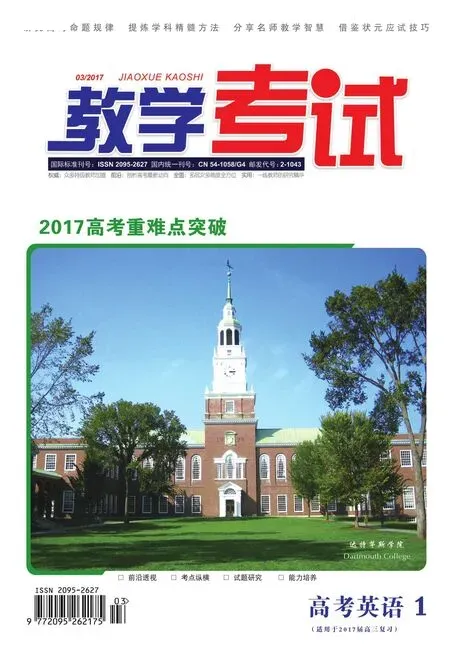掌握十大句式 提升写作能力
河南 庞先庆 王 艳
掌握十大句式 提升写作能力
河南 庞先庆 王 艳
【句式1】“it be +adj. +for/of sb. +to do sth.”句型
[真题链接]I thought it would be useful for him to learn Chinese at an early age. (2014全国卷Ⅱ,阅读)
[精品译文]我想他在早期学习中文是有用的。
[句型解读]该结构中,如果不定式前面的形容词说明不定式的特性,其逻辑主语一般由for引出;若形容词是描写人的品德、素质的,说明逻辑主语的特征,如 kind,honest,clever,wise,sensible,nice,tactful,thoughtful,brave,bold,foolish,stupid,wrong,cruel等,则不定式的逻辑主语就由of引出。
[温馨提醒]
有时不定式的动作执行者不是句子的主语,此时就需要在不定式前面加一个名词或代词来充当其逻辑主语,构成不定式的复合结构。
[即时演练]根据汉语提示,完成句子。
①我打算在大学学习艺术史,因此访问法国对我来说是很重要的。
I plan to study history of art at university so it is important________France.
②我们认为他问那位女士的年龄是不礼貌的。
We think it impolite_______the lady her age.
【Keys】①for me to visit;②of him to ask
【句式2】“be+形容词+不定式”句型
[真题链接]We were astonished to f nd the temple still in its original condition. (2010辽宁卷,25)
[精品译文]看到寺院仍然是原来的状况,我们感到非常震惊。
[句型解读]该句型中,不定式位于作表语、表示心理活动或情绪的形容词后面,作原因状语。
[温馨提醒]
这样的形容词主要有:happy,kind,surprised,frightened,angry,shocked,glad,delighted,disappointed,sorry,anxious,proud,clever,safe,dangerous,lucky,pleased,fortunate,right,astonished等。
[即时演练]根据汉语提示,完成句子。
虽然看到我们很惊讶,教授仍给我们一个热烈的欢迎。
Though________us,the professor gave us a warm welcome.
【Key】surprised to see
【句式3】“动词+it+宾语补足语(adj./n.)(+for sb.)+不定式(动名词或从句)”句型
[真题链接]The fact that she was foreign made it dif f -cult for her to get a job in that country. (2010辽宁卷,33)
[精品译文]她是外国人这个事实使她很难在那个国家找到一份工作。
[句型解读]当不定式、动名词、从句等复杂成分用作宾语且其后跟有宾语补足语时,通常会在宾语补足语前使用形式宾语it,而将真正的宾语移至句末,构成该句型。
[温馨提醒]
该句型中的动词通常是 think,f nd,feel,believe,take,consider,make,suppose等。
[即时演练]根据汉语提示,完成句子。
①我们觉得让我们的国家成为一个更加美好的地方是我们的责任。
We________our country a better place.
②这两个女孩长得很像,不熟悉的人很难将她俩区分开来。
The two girls are so alike that strangers_______one from the other.
【Keys】①feel it our duty to make;②f nd it diff cult to tell
【句式4】“动词(have,take,put,like等)+ it + that/ when (if)-从句”句型
[真题链接]Legend has it that the origin of the Dragon Boat Festival is to recall the soul of Qu Yuan. (2014江 苏卷,13)
[精品译文]端午节相传起源于回忆屈原精神。
[句型解读] “动词(have,take,put,like等)+ it+that-从句”“动词(enjoy,hate,love,like,dislike,appreciate,prefer等)+it+when(if)-从句”“动词(see to,look to,insist on,stick to,depend on,answer for,rely on 等)+ it + that-从句”三类结构中的形式宾语it无实际意义,由于英文句法结构的需要,其后没有宾语补足语。
[温馨提醒]
“动词(take it for granted,bring it to sb.’s attention,owe it to sb.等)+ that-从句”结构中的形式宾语it也无实际意义,其后也没有宾语补足语。
[即时演练]根据汉语提示,完成句子。
①如果你愿意教我如何使用电脑,我将非常感谢。
I’d________you would like to teach me how to use the computer.
②你放心,他会来接你的。
You may________he’ll come to meet you.
【Keys】①appreciate it if;②rely on it that
【句式5】“状语(表示方向、地点、时间的副词或表示方位、地点的介词短语)+不及物动词+主语(名词)”句型
[真题链接]There remains a certain doubt among the people as to the practical value of the project.(2009安徽卷,32)
[精品译文]关于那个工程的实用价值,人们还是心存某种疑虑。
[句型解读]主语是名词、谓语动词是be,remain,live,come,stand,lie,exist,go,run,rush,f ee,walk等不及物动词时,here,there,out,in,on,up,down,away,back,now,then等表示方向、地点、时间的副词放在句子的开头,引起全部倒装,以描述一个生动的情景。
[温馨提醒]
当谓语动词为be,come,sit,live,stand,lie,exist等不及物动词,表示方位、地点的介词短语作状语置于句首时,或当主系表结构中由表地点的介词短语所作的表语置于句首时,也使用该句型。
[即时演练]根据汉语提示,完成句子。
①有一会儿什么也没发生,接着就有一阵欢呼声。
For a moment nothing happened,_______voices all shouting together.
②山脚下坐落着一个村庄。________a village.
【Keys】①then came;②At the foot of the mountain lies
【句式6】以“only+状语”开头的句子使用倒装语序的句型
[真题链接]Only after Mary read her composition the second time did she notice the spelling mistake. (2012天津卷,6)
[精品译文]只有在Mary把作文读了第二遍后,她才注意到拼写的错误。
[句型解读]当only位于句首,修饰、强调状语(副词、介词短语、从句)时,句子的主体部分要用部分倒装语序,即把其中的助动词或者情态动词提到主语的前面。
[温馨提醒]
●在强调句中,当被强调部分是only所修饰的状语时,句子的主体部分无须倒装。例如:
It was only when I reread his poems recently that I began to appreciate their beauty. 只是在最近重读了他的诗,我才开始欣赏他们的美。
●如果only修饰的是句子的其他成分,则也无须倒装。例如:
Only Cinderella’s foot fit perfectly and so the prince chose to marry her. 只有灰姑娘的脚完全吻合,于是王子娶了她。
[即时演练]根据汉语提示,完成句子。
只有那时我才真正开始感谢爸爸和他的信仰。
________I truly begin to appreciate dad and his faith that guided us through the hard times.
【Key】Only then did
【句式7】“It is/was+被强调部分+who/that+其他成分”句型
[真题链接]It was in New Zealand that Elizabeth f rst met Mr. Smith.(2008全国卷Ⅱ,20)
[精品译文]伊丽莎白第一次见到史密斯先生是在新西兰。
[句型解读]该句式是强调句型。其中,it,that/who无词汇意义,it为强调词,引出被强调成分,that/who只起语法连接作用。
[温馨提醒]
如果被强调的部分在句子中作主语且是指人时,用who或that来连接都可以,如果是其他成分,则一律用that来连接。
[即时演练]根据汉语提示,完成句子。
首先想到骑车从沿湄公河源头到终点旅游的是我的姐姐。
________f rst had the idea to cycle along the entire Mekong River from where it begins to where it ends.
【Key】It was my sister that / who
【句式8】含if引导的条件状语从句的虚拟句型
[真题链接]Sorry,I am too busy now. If I had time,I would certainly go for an outing with you.(2012湖 南卷,29)
[精品译文]不好意思,我现在很忙。如果我(现在)有时间,我一定与你一起去郊游。
[句型解读]该句型表示与现在、过去及将来事实可能相反的假设。其if从句的谓语形式分别为“过去式(be用were)”“had+过去分词”和 “动词的过去式/ should+动词原形/were to+动词原形”;主句谓语形式分别为 “would/should/might/could +动词原形”“would/ should/might/could+have+过去分词”和“would/should/might/ could+动词原形”。
[温馨提醒]
●“If it were not for...I/they...would...”句型意为“如果不是……/如果没有……/要不是……,我/他(它)们……就会……”。其中,“If it were not for...”是表示与现在事实相反的虚拟条件句,were不能用was来代替;主句用“would +动词原形”表示虚拟语气。
●“If it had not been for...I/they...would/should/might/ could+have+过去分词”句型意为“(过去)如果不是……/(过去)如果没有……/要不是(过去)……,我/他(它)们……就(可能)会已经……”。其中,“If it had not been for...”是表示与过去事实相反的虚拟条件句;主句用“would/should/might/could+have+过去分词”表示虚拟语气。
[即时演练]根据汉语提示,完成句子。
①如果不是因为她不会唱歌,我就邀请她来参加聚会。
If________the fact that she can’t sing,I would invite her to the party.
②如果我的汽车性能更可靠些,去年夏天我就会开车去拉萨而不是坐飞机去了。
If my car________more reliable,I________to Lhasa instead of f ying last summer.
【Keys】①it were not for;②had been;would have driven
【句式9】用介词短语表达虚拟条件的句型
[真题链接]But for the help of my English teacher,I would not have won the f rst prize in the English Writing Competition.(2009福建卷,35)
[精品译文]如果没有英语老师的帮助,我不可能在英语写作比赛中获得一等奖。
[句型解读]在英语中,除了用if从句表示虚拟的情景外,还可以用but for和without等介词(短语)来表达虚拟的条件。前后者分别意为“要不是”“没有”,均相当于条件状语从句。
[即时演练]根据汉语提示,完成句子。
没有你的慷慨帮忙,我不可能熬过那段痛苦的日子。
I couldn’t have gone through that bitter period________your generous help.
【Key】without/but for
【句式10】宾语从句使用虚拟语气的句型
[真题链接]The doctor recommended that you shouldn’t swim after eating a large meal.(2009浙江卷,13)
[精品译文]医生建议你不应该在饱餐之后游泳。
[句型解读]表示“建议(suggest,advice,propose,recommend)、要求(demand ,request,require)、命令(order,command)”等主观意向的动词后的宾语从句使用虚拟语气,其谓语动词由“should +动词原形”构成,其中should可以省略。
[温馨提醒]
动词wish后接宾语从句时,从句谓语动词可以根据对现在、将来、过去的虚拟愿望分别采用“过去式(be动词用were)”“would/could+动词原形”“had+动词过去分词或could/would+have+动词过去分词” 等形式。
[即时演练]根据汉语提示,完成句子。
①他们要求给予每个成年男子选举权。
They demanded that the right to vote________to every adult man.
②彼得希望他读大学时学的是法律,而不是文学。
Peter wishes that he________law instead of literature when he was in college.
【Keys】①(should)be given;②had studied【随堂练习】
根据汉语提示,完成句子。
1. 事实上,如果我们今天听到的话,我们当然不能理解。
In fact,it is certain that we_______able to understand it if we_______it today.
2. 要不是约翰最近受伤了,我们昨天就把他的名字填在比赛名单里了。
We would have put John’s name on the race list yesterday________his recent injury.
3. 简苍白的脸色表明她生病了,她父母建议她做一次体检。
Jane’s pale face suggested that she________ill,and her parents suggested that she_______a medical examination.
4. 医生认为您最好休个假。
The doctor thought it would be good________a holiday. 5. 我们认为他们在几周内完成生产计划是可能的。We think it possible_______their production plan within a few weeks.
6. 当她1960年最初来到贡贝时,对女性来说住进大森林是件罕见的事情。
When she f rst arrived in Gombe in 1960,it was unusual_______in the forest.
7. 我讨厌人们满嘴含着食物说话。
I________people talk with their mouths full.
8.我喜欢秋天清爽明朗的日子。
I_______in the autumn_______the weather is clear and bright.
9. 在长江和嘉陵江的交汇处是重庆——中国最大的城市之一。________of the Yangtze River and Jialing River________Chongqing,one of the largest cities in China.
10. 重要的不是谁是对的,而是什么才是对的。
________is not who is right but what is right________is of importance.
【参考答案】1. would not be;heard 2. but for/without 3. was;(should)have 4. for you to have 5. for them to finish 6. for a woman to live 7. hate it when 8. like it;when 9. At the meeting place;lies 10. It;that
(作者单位:河南省镇平县雪枫中学)

